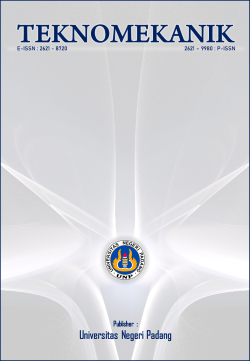The effects of leadership style, organizational culture and self-concept on trainers’ performance at the vocational training institutions
DOI:
https://doi.org/10.24036/jptk.v5i1.22423Keywords:
Leadership Styles, Organizational Culture, Self-Concept, Trainers’ PerformanceAbstract
The purpose of this study is to understand the influence between leadership style, organizational culture, and self-concept on the trainers’ performance at the Vocational Training Institutions in Batam. These factors are contributing a lot to the successive performance of the students, trainers, and institutions. However, this study only gives framework to the performance of the trainers. Improving trainers’ performance will lead to the improvement of training or educational operation. Some methods such as interviews, observations and questionnaires were used to collect the data. There were 82 trainers selected as respondents to fill the questionnaires, and the data obtained were analyzed using SPSS program. Statistical test methods such as prerequisite analytical tests, t-test, F-test, multiple linear regressions, and coefficients determination. The results give conclusion that there is significant effect and correlation between the leadership styles, organizational cultures, and self-concept on the trainers’ performance at the Vocational Training Institutions in Batam.
Downloads
References
As-Suwaidan, A. T., & Basyaril, F. (2005). Melahirkan pemimpin masa depan. Jakarta: Gema Insan.
Canadian Association Student Activity Advisors (CASAA). (2000). Leadership Styles. Downloaded from: http://www.sentex.net/~cassa/resources/sourcebook/student-leadership/leadership-styles.htm.
Campling, J.,Wiesner, R., & Schermerhorn. J. R. (2006). Management (2nd Asia- Pacific ed.). Sydney: John Wiley & Sons Australia, Ltd.
Cohen L & Manion L (1994). Research methods in education (4th ed.). London: Routledge.
Creswell, J. W. (2002). Educational research: Planning, conducting, and evaluating quantitative (p. 676). Upper Saddle River, NJ: Prentice Hall.
Daryanto. (2011). Media Pembelajaran. Bandung, Sarana Tutorial Nurani Sejahtera.
Gozali, I. (2001). Aplikasi Analisis Multivariate Dengan Program SPSS. Semarang, Universitas Diponegoro.
Fahmi, I. (2013). Manajemen Kepemimpinan (Teori dan Aplikasi). Bandung, Alfabeta.
Hadijah, A. (2015). Leadership in TVET for the 21st Century: Challenges, Roles and Characteristics. Procedia - Social and Behavioral Sciences, 195 (January), 1471–1476. https://doi.org/10.1016/j.sbspro.2015.06.446
McShein, E. (2004). Organizational culture and leadership, San Fransisco: John Wiley & Son.
McShane, E., & Von Glinow, M. A. (2008) Organizational behavior. New York: McGraw-Hill Companies, Inc.
Mullins. L. J. (2005). Management and Organizational Behavior. Edinburgh. Harlow, Essex: Prentice Hall.
Mulyasa, H.E. (2015). Manajemen dan Kepemimpinan Kepala Sekolah. Jakarta, Bumi Aksara.
Newstrom, J. W., & Davis, K. (2002). Organizational Behavior: Human behavior at work. New York: McGraw-Hill. Higher Education.
Northouse, P. G. (2013). Leadership: Theory and practice (6th ed.). Thousand Oaks: SAGE.
Razak, N. A. B. A., Jaafar, S. N. B., Hamidon, N. I. B., & Zakaria, N. B. (2014). Leadership Styles of Lecturer’s Technical and Vocational in Teaching and Learning. Journal of Education and Practice.
Riduwan & Sunarto. (2013). Pengantar Statistika Untuk Penelitian Pendidikan Sosial, Ekonomi, Komunikasi dan Bisnis. Bandung, Alfabeta.
Robbins, S. P., & Judge, T.A. (2009). Organizational Behavior. Upper Saddle River, New Jersey: Pearson Prentice Hall.
Rohiat & Saridewi, A. (2010). Manajemen Sekolah (Teori Dasar dan Praktik dilengkapi dengan contoh Rencana Strategik dan Operasional). Bandung: Refika Aditama.
Sarros, J. C., Cooper, B. K., & Santora, J. C. (2008). Through Transformational Leadership and Organizational Culture. Journal of Leadership & Organizational Studies, 15(2), 145–158.
Sheard, G., Kakabadse, A., & Kakabadse, N. (2016). Leadership Teams: Developing and Sustaining High Performance. https://doi.org/10.1057/9780230239487
Simanjuntak, M. Banjarnahor, A.R. Sari, O.H. Hasibuan, A. Simarmata, H.M.P. Hendrixon. Jamalusin. Simarmata, J. Parewe, A.M.A.K. Hasanah, N. Kifta, D.A. (2021). Manajemen Teknologi dan Inovasi. ISBN: 978-623-342-301-4.
Sugiyono. (2014). Metode Penelitian Pendidikan Pendekatan Kuatitatif, Kualitatif dan R&D. Bandung, Alfabeta.
Umar, H. (2008). Desain Penelitian MSDM dan Perilaku Karyawan: Paradigma Positivistik dan Berbasis Pemecahan Masalah. Edition 1st, Jakarta, Raja Grafindo Persada.
Wahyudi. (2012). Kepemimpinan Kepala Sekolah dalam Organisasi Pembelajaran. Bandung, Alfabeta.
Downloads
Published
Issue
Section
License
Copyright (c) 2022 Decky Antony Kifta, Syaiful Islami, Nizwardi Jalinus, Rijal Abdullah

This work is licensed under a Creative Commons Attribution 4.0 International License.





